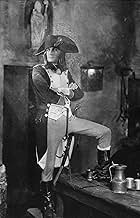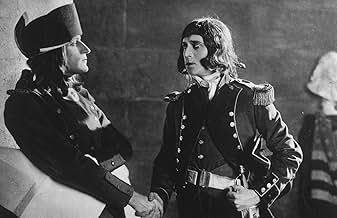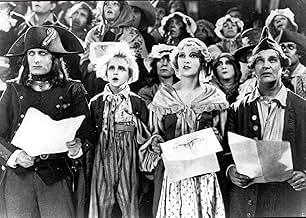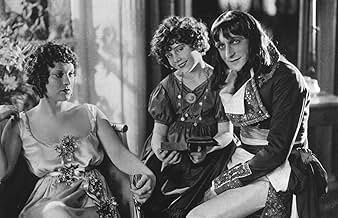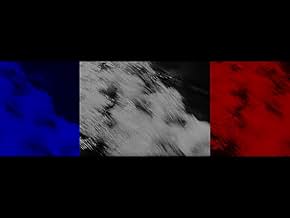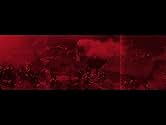IMDb-BEWERTUNG
8,2/10
9488
IHRE BEWERTUNG
Ein Film über die Jugend und die frühe Militärkarriere des französischen Generals.Ein Film über die Jugend und die frühe Militärkarriere des französischen Generals.Ein Film über die Jugend und die frühe Militärkarriere des französischen Generals.
- Auszeichnungen
- 4 wins total
Nicolas Roudenko
- Napoléon Bonaparte enfant
- (as Vladimir Roudenko)
Max Maxudian
- Barras
- (as Maxudian)
Empfohlene Bewertungen
January 23, 1981. Radio City Music Hall. Nearly midnight. One of the most thrilling experiences of my life. "Napoleon", restored, and reconstructed, not seen for over fifty years, was debuting in front of 6,000 people packed into the great theater with Carmine Coppolla conducting a huge orchestra rising up on the lift as lighting cast fifty foot shadows of the conductor on the walls. The score was magnificent. By the end of the film when the tryptyches stretched the size of the screen to triple size filling the glorious famous sunburst proscenium, Radio City Music Hall erupted in a standing ovation - and Kevin Brownlow, who restored the film, at that very moment from the theater had Abel Gance (soon to die) live on the phone from France to hear the ovation! Just incredible. Glorious. The film is a masterpiece of the Twentieth Century. And a must see. The best scene was the battle in the Convention between the Girondists and Jacobins superimposed on Napoleon's escape from Corsica in a sea storm. Staggering editing and camera work. It is a tragedy for us all the the remaining chapters of Napoleon's life were never put on film as Gance planned.
I had the privilege of seeing the restored version of this film, to the accompaniment of a live orchestra under the baton of Carmine Coppola, in Los Angeles' un-air-conditioned war memorial. Despite uncomfortable seating and terrible heat, the experience of this four hour movie remains a watershed for anyone who attended. To think that because of the invention of sound, this masterpiece was partially destroyed by Abel Gance in a fit of depression, is heartbreaking. More shocking is that Gance's invention of Cinemascope - of which today only the end of the film retains in its triptych screen effect - was lost to filmgoers until its reinvention years later.
Obviously true art can't be hidden forever, and Gance did live to see Napoleon take its rightful place in cinematic history. Though it is many years later, I can still remember the tears and the ovation when the black screen with the white signature, "Abel Gance", signified the end of the film. A compelling and great work of art.
Obviously true art can't be hidden forever, and Gance did live to see Napoleon take its rightful place in cinematic history. Though it is many years later, I can still remember the tears and the ovation when the black screen with the white signature, "Abel Gance", signified the end of the film. A compelling and great work of art.
Four showings at the art deco palace Paramount Theatre in downtown Oakland on March 24, 25, 31 and April 1 will be a landmark for cinemaphiles. From the opening snowball fight to the closing triptych of the eagle's shadow leading the Grande Armee, there was so much to love. Abel Gance takes you on a journey that your mind gets to ride with distinct pleasures. Robespierre in the John Lennonesque sunglasses, the teaching of the Marsailles, the dinghy with an escaping Napoleon and the General Assembly simultaneously in stormy seas, are but a few. I can't imagine I'll ever watch this on DVD after seeing it like I did. I certainly could never consider a sped up 24pp version. I watched Metropolis once like that and it just wasn't the same film. In fact criminal. So weirdly, I recommend the film but can't recommend seeing it unless a better format is available. I'm going to buy Carl Davis' score and play the film in my head from memory, which includes the crowd at the Paramount rising to their feet at the close shouting Vive La France! Vive La Gance!
Abel Gance's 'Napoleon' was premiered on April 7, 1927, at the Paris Opera House, the first movie to be accorded such an honor
It was been shown on a triple screen and to full orchestral accompaniment, running slightly under four hours
Impressive as it seems, it was conceived as the first of a six-part biography running many hours and tracing the life of Napoleon from childhood to the bitter end in St Helena Fortunately-for Abel Gance who directed and for us-the project was only completed to that moment where Napoleon enters Italy at the head of the French army, and the later and less pleasant aspects of his spectacular career were left unfilmed... The Little Corporal, after all, is a less controversial figure than the Emperor
Gance needed a figure as emblematic and powerful as 'Napoleon' to fulfill his dream of super cinema
'Napoleon' is a masterpiece of excess:
'Napoleon' is like one grand musical composition. It throbs with life
That was Gance the great filmmaker who thought that film could do everything and who said to Kevin Brownlow: 'For me, the cinema is not just pictures. It is something great, mysterious and sublime.' Brownlow is known now not only as an English filmmaker and film historian but also as a great restorer of silent films, notably Abel Gance's 'Napoleon.'
Impressive as it seems, it was conceived as the first of a six-part biography running many hours and tracing the life of Napoleon from childhood to the bitter end in St Helena Fortunately-for Abel Gance who directed and for us-the project was only completed to that moment where Napoleon enters Italy at the head of the French army, and the later and less pleasant aspects of his spectacular career were left unfilmed... The Little Corporal, after all, is a less controversial figure than the Emperor
Gance needed a figure as emblematic and powerful as 'Napoleon' to fulfill his dream of super cinema
'Napoleon' is a masterpiece of excess:
- The child Bonaparte keeps a pet eagle and wins a snow fight while at school in Brienne... In this sequence, the frame splits into nine subliminal images; as Napoleon watches his men entering Italy, the screen expands on each side to form a breathtaking panorama, then changes into three coordinated views of the scene
- The National Convention seems to sway and rock as Napoleon makes his escape from Corsica in a storm-tossed sailboat
- The Gallic of cabaret singers, Damia, leads French troops into battle personifying 'La Marseillaise'
'Napoleon' is like one grand musical composition. It throbs with life
That was Gance the great filmmaker who thought that film could do everything and who said to Kevin Brownlow: 'For me, the cinema is not just pictures. It is something great, mysterious and sublime.' Brownlow is known now not only as an English filmmaker and film historian but also as a great restorer of silent films, notably Abel Gance's 'Napoleon.'
At the weekend i went to see Napoleon at the Royal Festival Hall in London. I am a relative newcomer to silent moves but too see a 5 and a half hour performance with the London Philarmonic Orchestra was incredible. Loved it, there seems to be some dispute with Coppola about the rights to this production, but if it is ever done again, it is something that any serious movie goer should make an attempt to see. And to prevent others from seeing this with an orchestra would be a travesty. The music by Carl Davies added another dimension to what was a fantastic film. It would appear that the work is a lifes work for Kevin Brownlow, he should be very proud of this acheivements.
Wusstest du schon
- WissenswertesAbel Gance remembered one scene that was removed by the censors--that of the execution of civilians by soldiers. The camera is used like a bullet, zooming towards one human target, then another, then another. The sequence is lost, although a still photograph does survive.
- PatzerOne of the Corsicans in the inn states "Our fatherland is Italy with the Duke of Savoy". The Duchy of Savoy had ceased to exist in 1713 (eighty years earlier), when the Duchy acquired the Kingdom of Sardinia and the Duke then bore the title of the King of Sardinia. Italy was a geographic place not a political entity at this time.
- Alternative VersionenThere are apparently at least 19 different versions of this film, starting with the original 6-hours cut (in a "triptych" format, requiring three projectors on three screens, called Polyvision). It has been shown in various formats and different running times, including a 1934 version re-edited by director Abel Gance and featuring an added soundtrack.
- VerbindungenEdited into Napoléon Bonaparte (1935)
- SoundtracksThe Thrill of Being In Love (Love Theme of Napoleon and Josephine)
Music by Carmine Coppola
Lyrics by Italia Coppola (USA version)
UK version: score by Carl Davis (based largely on works by Beethoven)
Top-Auswahl
Melde dich zum Bewerten an und greife auf die Watchlist für personalisierte Empfehlungen zu.
- How long is Napoleon?Powered by Alexa
Details
- Erscheinungsdatum
- Herkunftsland
- Sprache
- Auch bekannt als
- Abel Gance's Napoleon
- Drehorte
- Domaine des Milelli, Ajaccio, Corse-du-Sud, Frankreich(Paolists' attack on Bonapartes' country house)
- Produktionsfirmen
- Weitere beteiligte Unternehmen bei IMDbPro anzeigen
Box Office
- Budget
- 20.000.000 FRF (geschätzt)
- Weltweiter Bruttoertrag
- 39.448 $
- Laufzeit
- 4 Std.(240 min)
- Farbe
- Sound-Mix
- Seitenverhältnis
- 1.33 : 1
Zu dieser Seite beitragen
Bearbeitung vorschlagen oder fehlenden Inhalt hinzufügen


